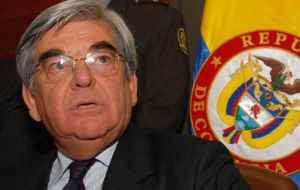MercoPress. South Atlantic News Agency
Colombian magistrate sends strong message to President Alvaro Uribe
 Nilson Pinilla, president of the constitutional court: “our duty is to the nation”
Nilson Pinilla, president of the constitutional court: “our duty is to the nation” The head of Colombia’s Constitutional court Nilson Pinilla said the country can “trust” the decision of the court, regarding the law that calls for a referendum on the re-election of President Alvaro Uribe for a third consecutive term.
“Colombia can trust that the decision is in good hands and will be taken according to constitutional principles”, said Pinilla interviewed Monday by the country’s most influential daily El Tiempo. He also anticipated that the country’s highest court would take four to five months to come to a decision.
“Legislators have a limited competence to alter the Constitution, and the court will decide whether the congressional debates followed the rules of procedure and honoured the Constitution”, added Pinilla.
Earlier last week the Colombian Congress approved a bill to hold a referendum on whether to allow presidents the option of a third consecutive term.
The Colombian referendum bill must be approved by the Constitutional Court before it is put to the people. If the proposal secures majority support, Uribe would then be free to run again in the May 2010 presidential election.
President Uribe is one of the most popular leaders Colombia has had in decades and so far officially has only said he would like to ensure the continuation (re-re-election) of his policies “democracy and security”, which have the guerrillas on the run and boosted the economy, making him undisputed in public opinion polls ratings.
But this has not impeded his party to lobby strongly for the special law opening the way for a referendum.
Uribe was first elected in 2002 and became the first president in Colombia to seek re-election following his term in office. With support from Congress and approval from the Constitutional Court Uribe was able to seek a second period in 2006. He was re-elected with 62% of the vote, but since then, claims of vote trading in Congress to have the reform bill approved have persistently surfaced.
Magistrate Pinilla underlined that the support or repeal of the bill, according to constitutional principles, “it’s not a game but a complex, in depth consideration and is an obligation we have with the nation to be correct in our interpretation”.
Moreover “we expect the ample contribution and participation of different sectors of Colombian society” when the bill is analyzed, insisted Pinilla.
The referendum bill opening the way for a third presidential term was voted last week following days of debate and in the midst of opposition claims that “rewards and compensations” had been generously offered to lawmakers to support the initiative.
Regarding “threats” or “pressures” on the court, Pinilla admitted they “could exist” but he also pointed out that the nine magistrates are jurists with a vast domestic and international experience and “they won’t be moved or intimidated with notes or phone calls; our duty is with the nation”.
The latest opinion polls show that should President Uribe decide to run again in 2010 he would be supported by a majority of Colombians. According to Datexco, 54.5% of voters would choose Uribe. The poll interviewed 1.200 people nationwide between September 2 and 3 and marked a slight increase from last July’s 49%.




Top Comments
Disclaimer & comment rulesCommenting for this story is now closed.
If you have a Facebook account, become a fan and comment on our Facebook Page!